Related Research Articles
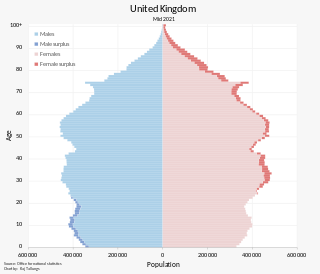
The population of the United Kingdom was estimated at 67,596,281 in 2022. It is the 21st most populated country in the world and has a population density of 279 people per square kilometre, with England having significantly greater density than Wales, Scotland, and Northern Ireland. Almost a third of the population lives in south east England, which is predominantly urban and suburban, with 8,866,180 people in the capital city, London, whose population density was 5,640 inhabitants per square kilometre (14,600/sq mi) in 2022.
A nationwide census, known as Census 2001, was conducted in the United Kingdom on Sunday, 29 April 2001. This was the 20th UK census and recorded a resident population of 58,789,194.
Christianity is the dominant religion in the United Kingdom. Results of the 2021 Census for England and Wales showed that Christianity is the largest religion, followed by the non-religious, Islam, Hinduism, Sikhism, Judaism, Buddhism, and Taoism. Among Christians, Anglicanism is the most common denomination, followed by Catholicism, Presbyterianism, Methodism, Unitarianism, and Baptism. Results for the 2022 census in Scotland showed that 38.8% of the Scottish population identified as Christian, with 20.4% stating that the Church of Scotland is their main religion, whilst 13.3% stated their main religion was the Catholic church in Scotland.
The United Kingdom Census 1901 was the 11th nationwide census conducted in the United Kingdom of Great Britain and Ireland, and was done on 31 March 1901 "relating to the persons returned as living at midnight on Sunday, March 31st".
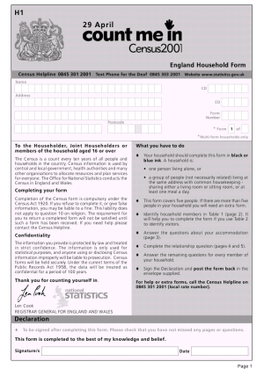
Coincident full censuses have taken place in the different jurisdictions of the United Kingdom every ten years since 1801, with the exceptions of 1941, Ireland in 1921/Northern Ireland in 1931, and Scotland in 2021. In addition to providing detailed information about national demographics, the results of the census play an important part in the calculation of resource allocation to regional and local service providers by the UK government.

The demography of Scotland includes all aspects of population, past and present, in the area that is now Scotland. Scotland had a population of 5,463,300 in 2019. The population growth rate in 2011 was estimated as 0.6% per annum according to the 2011 GROS Annual Review.

The United Kingdom Census of 1841 recorded the occupants of every United Kingdom household on the night of Sunday 6 June 1841. The enactment of the Population Act 1840 meant a new procedure was adopted for taking the 1841 census. It was described as the "first modern census" as it was the first to record information about every member of the household, and administered as a single event, under central control, rather than being devolved to a local level. It formed the model for all subsequent UK censuses, although each went on to refine and expand the questions asked of householders.
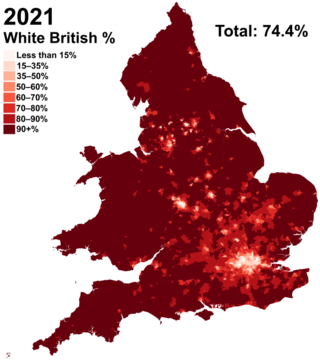
White British is an ethnicity classification used for the White population identifying as English, Scottish, Welsh, Cornish, Northern Irish, or British in the United Kingdom Census. In the 2011 census, the White British population was 49,997,686, 81.5% of Great Britain's total population. For the United Kingdom entirely, due to different reporting measures within Northern Ireland which includes all those who identified as British with those who identified as Irish, an amalgamated total of 52,320,080 including those who identified as White Irish in Great Britain is given making up 82.8% of the population.
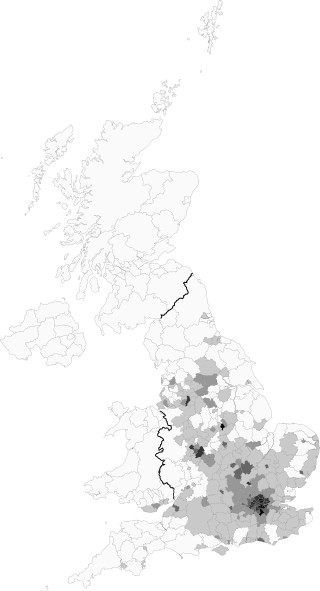
Mixed is an ethnic group category that was first introduced by the United Kingdom's Office for National Statistics for the 2001 Census. Colloquially, it refers to British citizens or residents whose parents are of two or more races or ethnic backgrounds. The Mixed or Multiple ethnic group numbered just under 1.8 million in the 2021 United Kingdom census or 2.7% of the total UK population.

Buddhism in the United Kingdom is the fifth-largest religious group in the United Kingdom. The 2021 United Kingdom census recorded just under 290,000 Buddhists, or about 0.4% of the total population, with the largest number of Buddhists residing in Greater London and South East England. According to a Buddhist organisation, the growth of Buddhism in the United Kingdom is mainly a result of conversions.
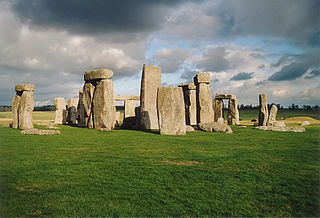
The Modern Pagan movement in the United Kingdom is primarily represented by Wicca and Neopagan witchcraft, Druidry, and Heathenry. 74,631 people in England, Scotland and Wales identified as either as Pagan or a member of a specific Modern Pagan group in the 2011 UK Census.
Lebanese people in the United Kingdom include people originating from Lebanon who have migrated to the United Kingdom and their descendants.

Since 1922, the United Kingdom has been made up of four countries: England, Scotland, Wales and Northern Ireland. The UK prime minister's website has used the phrase "countries within a country" to describe the United Kingdom.
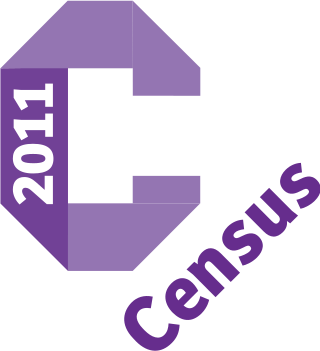
A census of the population of the United Kingdom is taken every ten years. The 2011 census was held in all counties of the UK on 27 March 2011. It was the first UK census which could be completed online via the Internet. The Office for National Statistics (ONS) is responsible for the census in England and Wales, the General Register Office for Scotland (GROS) is responsible for the census in Scotland, and the Northern Ireland Statistics and Research Agency (NISRA) is responsible for the census in Northern Ireland.

This article lists the results for the Wales during the First and Second World War. During this period no caps were awarded.
The United Kingdom Census of 1881 recorded the people residing in every household on the night of Sunday 3 April 1881, and was the fifth of the UK censuses to include details of household members.

The 2021 United Kingdom census is the 23rd official census of the United Kingdom. Beginning in 1801, they have been recorded every 10 years. The 2021 censuses of England, Wales, and Northern Ireland took place on 21 March 2021, and the census of Scotland took place 364 days later on 20 March 2022. The censuses were administered by the Office for National Statistics (ONS) in England and Wales, by the Northern Ireland Statistics and Research Agency (NISRA) in Northern Ireland, and by the National Records of Scotland in Scotland. These were the first British censuses for which most of the data was gathered online. Two of them went ahead despite the COVID-19 pandemic, in part because the information obtained would assist government and public understanding of the pandemic's impact. The census-taking in Scotland was postponed, and took place in 2022 because of the pandemic.
The United Kingdom Census 1871 was a census of the United Kingdom of Great Britain and Ireland carried out on Sunday 2 April 1871. It added the categories of "lunatic" to those recorded as infirm.
References
- ↑ "Census records". The National Archives. Retrieved 7 March 2018.
- ↑ 1801-1901. Office for National Statistics. Archived by The National Archives 28 January 2016. Retrieved 13 July 2017.
- ↑ "1891 England, Wales & Scotland Census". FindMyPast. Retrieved 15 December 2021.